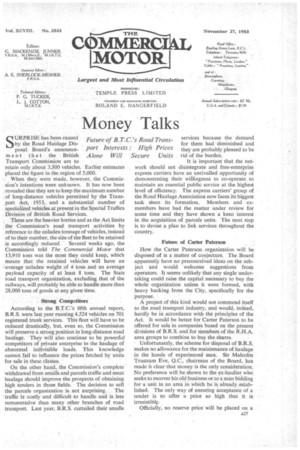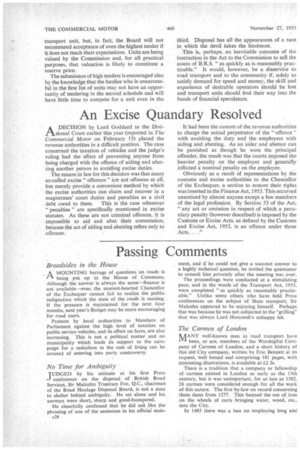Money Talks
Page 29

Page 30

If you've noticed an error in this article please click here to report it so we can fix it.
Future of B.T.C.'s Road Transport Interests : High Prices Alone Will Secure Units SURPRISE has been caused by the Road Haulage Disposal Board's announcement that the British Transport Commission are to retain only about 3,500 vehicles. Earlier estimates placed the figure in the region of 5,000.
When they were made, however, the Commission's intentions were unknown. It has now been revealed that they are to keep the maximum number of long-distance vehicles permitted by the Transport Act, 1953, and a Substantial number of • specialized vehicles at present in the Special Traffics • Division of British Road Services.
These are the heavier lorries and as the Act limits the Commission's road transport activities by reference to the unladen tonnage of vehicles, instead of to their number, the size of the fleet to be retained is accordingly reduced. Several weeks ago, the Commission told The Commercial Motor that 13,910 tons was the most they could keep, which means that the retained vehicles will have an -average unladen weight of 4 ions and an average payload capacity of at least 8 tons. The State road transport organization, excluding that of the railways, will probably be able to handle more than 28,000 tons of goods at any given time.
Strong Competitors According to the B.T.C.'s fifth annual report. B.R.S. were last year running 4,524 vehicles on 701 registered trunk services. This fleet will have to be reduced drastically, but, even so, the Commission will preserve a strong position in long-distance road haulage. They will also continue to be powerful competitors of private enterprise in the haulage of abnormal indivisible loads. This knowledge cannot fail to influence the prices fetched by units for sale in these classes.
On the other hand, the Commission's complete withdrawal from smalls and parcels traffic and meat haulage should improve the prospects of obtaining high tenders in those fields. The decision to sell the parcels organization is not surprising. The traffic is costly and difficult to handle and is less remunerative than many other branches of road transport. Last year, B.R.S. curtailed their smalls services because the demand for them had diminished and they are probably pleased to be rid of the burden.
It is important that the network should not disintegrate and free-enterprise express carriers have an unrivalled opportunity of demonstrating their willingness to co-operate . maintain an essential public service at the highest level of efficiency. The express carriers' group of the Road Haulage Association now faces its biggest task since its formation. Members and exmembers have had the matter under review for some time and they have shown a keen interest in the acquisition of parcels units. The next step is to devise a plan to link services throughout the country.
Future of Carter Paterson How the Carter Paterson organization will be disposed of is a matter of conjecture. The Board apparently, have no preconceived ideas on the subject and would welcome suggestions from operators. It seems unlikely that any single undertaking could raise the capital necessary to buy the whole organization unless it were -formed, with heavy backing from the City, specifically for the purpose. • A project of this kind would not commend itself to the road transport industry, and would, indeed, hardly be in accordance with the principles of the Act. It would be better for Carter Paterson to be offered for sale in companies based on the present divisions of B.R.S. and for members of the R.H.A.
area groups to combine to buy the shares.
Unfortunately, the scheme for disposal of B.R.S. makes no allowance for the maintenance of haulage in the hands of experienced men. Sir Malcolm Trustram Eve, Q.C., chairman of the Board, has made it clear that money is the only consideration. No preference will be shown to the ex-haulier who seeks to recover-his old business or to a man bidding for a unit in an area in which he is already established. The only way of ensuring acceptance of a tender is to offer a price so high that it is irresistible.
Officially, no reserve price will be placed on a transport unit, but, in fact, the Board will not recommend acceptance of even the highest tender if it does not teach their expectations. Units are being valued by the Commission and, for all practical purposes, that valuation is likely to constitute a reserve price.
The submission of high tenders is encouraged also by the knowledge that the haulier who is unsuccessful in the first list of units may not have an opportunity of tendering in the second schedule and will have little time to compete for a unit even in the third. Disposal has all the appearances of a race in which the devil takes the hindmost.
This is, perhaps, an inevitable outcome of the instruction in the Act to the Commission to sell the assets of B.R.S. "as quickly as is reasonably practicable." It would, however, be a disservice to road transport and to the community if, solely to satisfy demand for speed and money, the skill and experience of desirable operators should be lost and transport units should find their way into the hands of financial speculators.




























































































